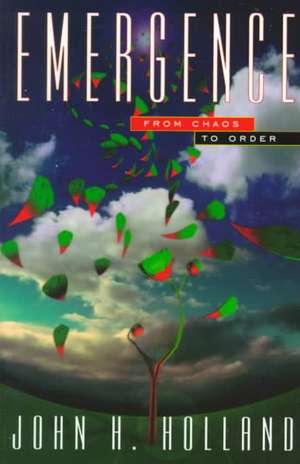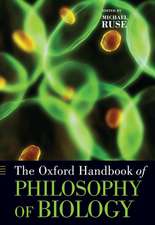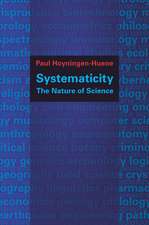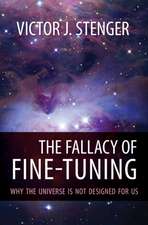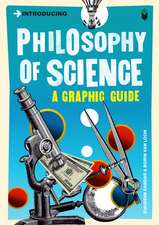Emergence: From Chaos To Order
Autor John H. Hollanden Limba Engleză Paperback – 23 apr 1999
In this important book, John H. Holland dramatically shows us that the “emergence” of order from disorder has much to teach us about life, mind and organizations. Creative activities in both the arts and the sciences depend upon an ability to model the world. The most creative of those models exhibits emergent properties, so that “what comes out is more than what goes in.” From the ingenious checkers-playing computer that started beating its creator in game after game, to the emotive creations of the poet, Emergence shows that Holland's theory successfully predicts many complex behaviors in art and science.
| Toate formatele și edițiile | Preț | Express |
|---|---|---|
| Paperback (2) | 137.83 lei 32-37 zile | |
| Oxford University Press – 16 mar 2000 | 137.83 lei 32-37 zile | |
| BASIC BOOKS – 23 apr 1999 | 175.15 lei 6-8 săpt. |
Preț: 175.15 lei
Nou
Puncte Express: 263
Preț estimativ în valută:
33.52€ • 35.84$ • 27.94£
33.52€ • 35.84$ • 27.94£
Carte tipărită la comandă
Livrare economică 17 aprilie-01 mai
Preluare comenzi: 021 569.72.76
Specificații
ISBN-13: 9780738201429
ISBN-10: 0738201421
Pagini: 272
Dimensiuni: 136 x 209 x 17 mm
Greutate: 0.3 kg
Editura: BASIC BOOKS
Colecția Basic Books
ISBN-10: 0738201421
Pagini: 272
Dimensiuni: 136 x 209 x 17 mm
Greutate: 0.3 kg
Editura: BASIC BOOKS
Colecția Basic Books
Notă biografică
John H. Holland holds joint appointments in the Electrical Engineering and Psychology Departments of the University of Michigan, Ann Arbor. He is known worldwide as the “father of genetic algorithms” and as one of the deans of “complexity studies” at the Santa Fe Institute. He is the author of the groundbreaking book Hidden Order: How Adaptation Builds Complexity (also from Perseus Books).
Descriere
Descriere de la o altă ediție sau format:
This new book, by acclaimed scientist- John Holland, introduces the reader to the exciting new theory of 'emergence', which many people now consider to be the single most characteristic feature of complex, adaptive systems. By 'emergence' it is meant that such systems tend to involve large numbers of intelligent, adaptive agents, interacting on the basis of local information possessed by each agent. These interactions produce global behaviour that cannot be understood simply by knowledge of the individual agents; it is 'emergent behaviour'. Examples of phenomena of this kind are price movements on speculative markets (where agents are individual traders) or road-traffic patterns (where the agents are individual drivers). The book explores the theory of 'emergence', demonstrating how a small number of rules or laws can generate systems of surprising complexity. Board games provide an ancient and direct example: Chess is defined by fewer than two dozen rules, but the myriad patterns that result lead to perpetual novelty and emergence. The discovery of similar patterns in other facets of our world opens the way to a deeper understanding of the complexity of life, answering such questions as: How does a fertilised egg program the development of a trillion-cell organism? How can we build human organisations that respond rapidly to change through innovation? Throughout the book, Holland compares the different systems and models that exhibit emergence in the quest for common rule or laws. These range from the tiny seed "that encloses specifications that produce structures as complicated and distinctive as the giant redwood and the common daisy", to the checkers-playing computer that learned to beat its creator consistently, to the ant colonies that build bridges over chasms and navigate leaf-boats on streams, to the emotive creations of the past. All are explored in a book that will have important ramifications for every aspect of human intellectual endeavour. Reviews "John Holland is an exceptionally imaginative person. Often surprising, and always engaging, he takes the reader on a journey from simplicity to complexity, showing how a few 'rules of engagement' can lead to systems as bewilderingly rich as the neural networks in our brains, our immune defenses against pathogens, and even the ecosystems that maintain the biosphere so that life can flourish" Sir Robert May, Chief Scientific Advisor to the UK Government, and one of the founders of Chaos Theory" "Holland at his best - a crisp, insightful framework for analysing and modelling emergent phenomena" John Seely Brown, Chief Scientist, Xerox Corporation "I think it's safe to say that this book will certainly be a significant contribution to the field of complex system theory. And I can't think of a person more well-qualified to write such an account." Professor John Casti, Santa Fe Institute, and author or Would-be worlds.
This new book, by acclaimed scientist- John Holland, introduces the reader to the exciting new theory of 'emergence', which many people now consider to be the single most characteristic feature of complex, adaptive systems. By 'emergence' it is meant that such systems tend to involve large numbers of intelligent, adaptive agents, interacting on the basis of local information possessed by each agent. These interactions produce global behaviour that cannot be understood simply by knowledge of the individual agents; it is 'emergent behaviour'. Examples of phenomena of this kind are price movements on speculative markets (where agents are individual traders) or road-traffic patterns (where the agents are individual drivers). The book explores the theory of 'emergence', demonstrating how a small number of rules or laws can generate systems of surprising complexity. Board games provide an ancient and direct example: Chess is defined by fewer than two dozen rules, but the myriad patterns that result lead to perpetual novelty and emergence. The discovery of similar patterns in other facets of our world opens the way to a deeper understanding of the complexity of life, answering such questions as: How does a fertilised egg program the development of a trillion-cell organism? How can we build human organisations that respond rapidly to change through innovation? Throughout the book, Holland compares the different systems and models that exhibit emergence in the quest for common rule or laws. These range from the tiny seed "that encloses specifications that produce structures as complicated and distinctive as the giant redwood and the common daisy", to the checkers-playing computer that learned to beat its creator consistently, to the ant colonies that build bridges over chasms and navigate leaf-boats on streams, to the emotive creations of the past. All are explored in a book that will have important ramifications for every aspect of human intellectual endeavour. Reviews "John Holland is an exceptionally imaginative person. Often surprising, and always engaging, he takes the reader on a journey from simplicity to complexity, showing how a few 'rules of engagement' can lead to systems as bewilderingly rich as the neural networks in our brains, our immune defenses against pathogens, and even the ecosystems that maintain the biosphere so that life can flourish" Sir Robert May, Chief Scientific Advisor to the UK Government, and one of the founders of Chaos Theory" "Holland at his best - a crisp, insightful framework for analysing and modelling emergent phenomena" John Seely Brown, Chief Scientist, Xerox Corporation "I think it's safe to say that this book will certainly be a significant contribution to the field of complex system theory. And I can't think of a person more well-qualified to write such an account." Professor John Casti, Santa Fe Institute, and author or Would-be worlds.
